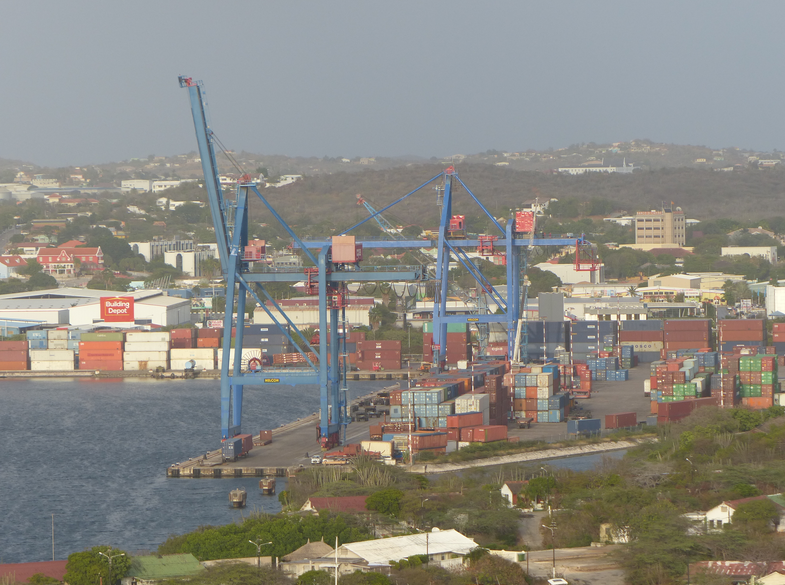
This CPS has been in the news recently due to the debates in parliament about the monopoly position this company has in the harbor of Curaçao.
The history of the local company is quite complicated, but it does give you an understanding of why it is so important for the island and also why it is the target of every politician with a “social” agenda.
Before CPS, there were three stevedoring companies on the island. These companies were NASPO N.V., which was owned by the Perret-Gentil family, HEMC, which consisted of 3 companies, namely Maduro Holding, CTC Real Estate & Participatie Maatschappij and NEDLLOYD, and the third company Gomez Stevedoring, owned by the Da Costa Gomez family. Back then there were no containers, just bulk.
This was a worldwide problem. The harbor in Curacao was not organized at all. There were serious issues with theft (Pilferage). “For example, when you imported 20 TV’s, you would only get 11,” said the CPS representative. Pilferage was sky high on the island. Insurance companies were fed up. “This was actually an international problem. But here in Curaçao it was really high. Experts came up with the idea of containers. Loading these containers with your boxes and shipping it. This fact required a container crane, however.
During that time the Queen of The Netherlands announced that she would give Curaçao a crane as a gift, but under the condition that the harbor would be organized. The Queen told the government that there should be only one company to run the harbor in Curaçao in this respect. That was a condition sine qua non.”
According to the CPS representative, the Queen was adamant about one company running the harbor before giving Curaçao an 11 million dollars’ worth container crane. Curaçao did not have that money to buy the crane. That’s when the Government of Curaçao approached the existing stevedores with the request to form only one Stevedoring company. One thing led to another and Curacao Port Services “CPS” was established. This fact also led to the establishment of the Curacao Port Authorities (CPA), a governmental entity.
The Netherlands then decided to give the Government of Curacao the container crane as a gift. That’s also when the CPS received the concession to run the harbor. The government wanted to put a time limit to the concession. But the problem with this was that the government had no idea how long it would take before the CPS would get a return on investment. We must keep in mind here that the existing Stevedoring companies where all money making companies who, for the sake of organization, and to assist the government in getting the crane, decided to go into an adventure. They did not know what the situation would become. This is why they agreed to implicitly extend the contract every 10 years. This means that the contract does not have a date. But for the government to put a stop to it, is not easy. They cannot just stop it.
Perret-Gentil was at the helm of the company for many years. He re-organized the harbor. There were about 1000 employees, which was totally superfluous. “It’s the same situation with Aqualectra or UTS now.” Perret-Gentil brought it down to about 300 to 400 employees. He entered into agreements with many of them. Most left content. For example, those who reached retirement age did not receive an extension of their contract. Those who did not perform well, received an attractive arrangement they could not reject. This is how CPS was born.
The risks were high and many. CTC and Nedlloyd decided that they would not be part of the new company. They even decided to leave the island. Perret-Gentil and Maduro bought the NEDLOYD’s shares. Da Costa Gomez bought the CTC’s shares. CPS was then owned by Perret-Gentil, Maduro (Van der Kwast) and Da Costa Gomez.
There was another problem that had to be resolved. All the heavy equipment in the harbor was owned by a company called AGT. The Aruban Eduardo de Veer was the owner of this company. Perret-Gentil then decided to negotiate with De Veer about purchasing this heavy equipment. “We had to become owners of this equipment. De Veer told us that he would sell them for an amount of money. CPS did not have that kind of money. They made De Veer an offer of cash and shares in the company. De Veer agreed. It was a big risk, because nobody knew if the company was going to be successful.”
“CPS was then owned by 4 shareholders, Perret-Gentil, Maduro Holding, De Veer and Da Costa Gomez. CPS was a success. The Government received a second crane. The cranes are the property of the Curaçao Ports Authority (CPA). CPA owns the harbor. CPS leases the harbor facilities and the container cranes.” In the new negotiations the Government (CPA) wants the CPS to buy two new cranes. The privately owned company must invest about 50 million guilders. Negotiations are still ongoing.
Bron: CuracaoChronicle

